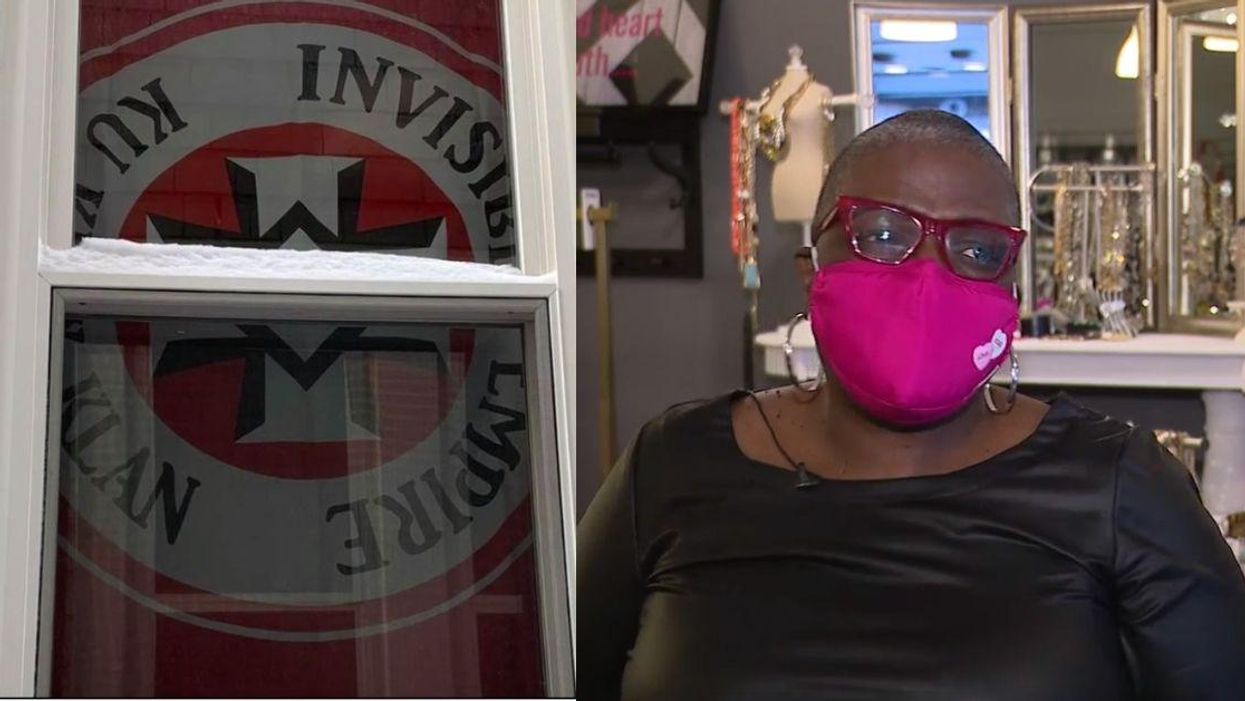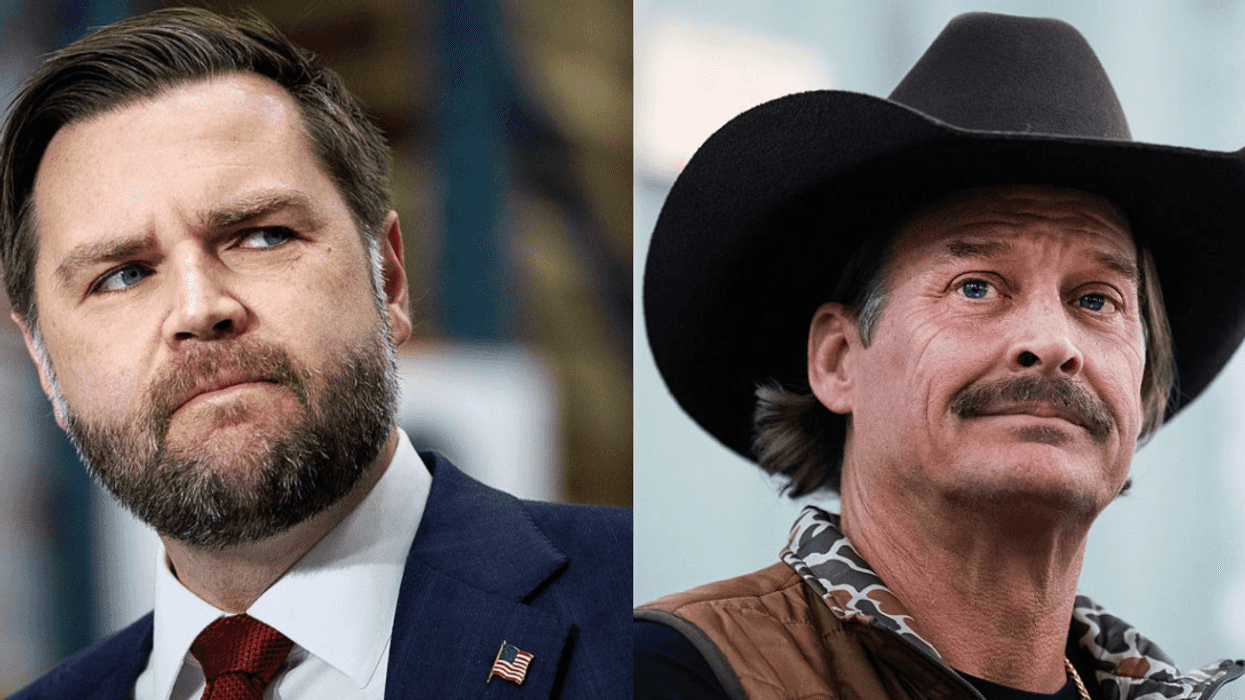A Black woman from Gross Pointe Park, Michigan was shocked to discover her neighbor had put up a KKK flag in the interior of his window facing her home.
Jedonna Dinges, who owns a Ferndale clothing boutique, posted a photo of the offensive flag representing the White supremacist terrorist hate group.
The flag read:
"Ku Klux Klan, Invisible Empire"
She told the Detroit Free Press she was "furious."
"How dare he feel comfortable putting a symbol of hatred, violence and domestic terrorism at his window facing my house?"
"I'm a human being. I deserve to be treated with dignity and respect like everybody else in this community."
She told Fox 2 News Detroit of her initial reaction:
"I said, I know there's not a Klan sign in the window next door."
"And I opened the curtains and I looked and sure enough, there was a klan sign in the window next door."
Dinges had moved to the community 11 years ago and said she had no issues except for the house next door which seemed to be a problem from the beginning.
You can watch the Fox News 2 news report here.
She told the news outlet of another incident in which her ex-husband noticed someone had left a container filled with gasoline in her dumpster.
This prompted Dinges to install a security camera on her window sill.
After a friend who does anti-racism and social justice work in the community recommended Dinges call the police on the day she first saw the KKK flag, she decided to call the FBI instead because the police had previously offered little help.
However, the FBI did nothing beyond taking a report since the neighbor did not harm Dinges or call her a racial slur.
Eventually, she got the media involved, which subsequently led to detectives visiting the neighbor and urging them to remove the flag.
Dinges explained the reason why the neighbor put up the banner.
"Detectives who came out from the Grosse Pointe Park Police Department told me, that the reason the neighbors put the Klan sign up was because I put a camera on my windowsill to record what was happening along the side of my house to protect myself."
The neighbor told police they never confronted the Dinges family about the camera being pointed at his house because he was "non-confrontational."
Dinges recalled with Fox News 2:
"When the police asked the neighbor about it, he said 'Well I didn't want to go over there and say anything to her, we never had any problems with them'."
"They made it clear with the police 'we never had any problem with her, but we're non-confrontational people'. I don't know how you get any more confrontational than a Klan sign."
Grosse Pointe Park Mayor Robert Denner issued a statement after hearing about the KKK flag.
"We need to make it clear that that sort of behavior is not welcome in our city."
Lauri Read Grosse Pointe Park councilwoman added:
"We're shocked. Sadly Jedonna was not shocked by these actions and that says a lot."
The NAACP of Grosse Pointe and Harper Woods issued a statement saying the display of the KKK flag in the community was indicative of a deeper problem in the community.
The statement read:
"This incident occurred after the victim reported to police she had discovered a gas can, full of gasoline, inserted in her covered trash bin placed next to her house."
"When officers arrived, the Black neighbor says she was told there really wasn't anything they could do. Now weeks later, she didn't even want to call the Grosse Pointe Park Public Safety Department for help with what is clearly an attempt at ethnic intimidation by displaying the KKK flag directly at her and her family."
The statement continued to reveal a sobering statistic that needed to be addressed.
"The Grosse Pointe Park patrol force is 100% white and male. No person of color has ever patrolled the city streets and only one woman appears to have done so in the city's 71-year history."
"That fact must change. A modern, diverse police force would have a very different response to investigating acts of ethnic intimidation and potential domestic terrorism."
During a conference call on Tuesday with city officials and police, Dinges mentioned it was the police department's culture that prompted her to reach out to the media instead of seeking help from the department.
Dinges recalled her conversation from the conference call:
"The culture in this community is broken, the culture in this community says that Black and Brown people are not safe. It's in this country, and this community is in this country."
"If Black and Brown people felt safe with the police, being spoken to by the police, being dealt with by the police and calling the police, we would call you. I didn't call you because I didn't think you cared."
The neighbor did remove the flag after the police visit and has not bothered Dinges since.
Dinges was relieved a good majority of the community seemed to have her back.
"The number of people that have reached out to me, I'm overcome with emotion at the love and support that I've received from strangers in my community," she said.








 Roberto Schmidt/AFP via Getty Images
Roberto Schmidt/AFP via Getty Images





 u/pizzaratsfriend/Reddit
u/pizzaratsfriend/Reddit u/Flat_Valuable650/Reddit
u/Flat_Valuable650/Reddit u/ReadyCauliflower8/Reddit
u/ReadyCauliflower8/Reddit u/RealBettyWhite69/Reddit
u/RealBettyWhite69/Reddit u/invisibleshadowalker/Reddit
u/invisibleshadowalker/Reddit u/Wishnik6502/Reddit
u/Wishnik6502/Reddit u/kateastrophic/Reddit
u/kateastrophic/Reddit u/blking/Reddit
u/blking/Reddit u/SlagQueen/Reddit
u/SlagQueen/Reddit u/geezeslice333/Reddit
u/geezeslice333/Reddit u/meertaoxo/Reddit
u/meertaoxo/Reddit u/crystal_clear24/Reddit
u/crystal_clear24/Reddit u/stinkpot_jamjar/Reddit
u/stinkpot_jamjar/Reddit
 u/Bulgingpants/Reddit
u/Bulgingpants/Reddit
 @hackedliving/TikTok
@hackedliving/TikTok @hackedliving/TikTok
@hackedliving/TikTok @hackedliving/TikTok
@hackedliving/TikTok @hackedliving/TikTok
@hackedliving/TikTok @hackedliving/TikTok
@hackedliving/TikTok @hackedliving/TikTok
@hackedliving/TikTok @hackedliving/TikTok
@hackedliving/TikTok @hackedliving/TikTok
@hackedliving/TikTok @hackedliving/TikTok
@hackedliving/TikTok @hackedliving/TikTok
@hackedliving/TikTok
 @vanderjames/Instagram
@vanderjames/Instagram @vanderjames/Instagram
@vanderjames/Instagram @vanderjames/Instagram
@vanderjames/Instagram @vanderjames/Instagram
@vanderjames/Instagram @vanderjames/Instagram
@vanderjames/Instagram @vanderjames/Instagram
@vanderjames/Instagram @vanderjames/Instagram
@vanderjames/Instagram @vanderjames/Instagram
@vanderjames/Instagram @vanderjames/Instagram
@vanderjames/Instagram @vanderjames/Instagram
@vanderjames/Instagram